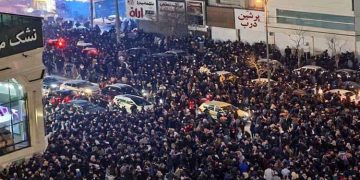Mahan Taraj: “Our generation has the duty to make justice the pillar of freedom”
On Saturday, October 25, 2025, the Youth Gathering for a Free Iran 2025 was held with broad participation from young supporters of the Iranian Resistance from Europe, the United States, Canada, and Australia, and it was connected live to simultaneous gatherings in Bonn, London, and Zurich. At this conference, held on the eve of the anniversary of the
2019 uprising and attended by Mrs. Maryam Rajavi, Mahan Taraj spoke on behalf of the delegation of young lawyers and jurists:
“Mrs. Rajavi, ladies and gentlemen, dear friends,
As a French -Iranian jurist, I am addressing you on behalf of our collective of young lawyers and jurists. I was born in Iran and came to France at a very young age with my parents, who were fleeing the clerical repression. I studied law in France and the United States and today work for a large international group. My family is one example among many others demonstrating that the struggle for freedom and democracy never dies out.
This is a struggle; it is a flame passed from generation to generation to resist dictatorship, whether monarchic or theocratic. I want to speak with you about a fundamental issue for Iran’s future: law and justice. For more than four decades, the judicial system of the clerical regime has been the very embodiment of injustice.
This system has perverted law into a tool of state repression. Under the guise of religion, it has legitimized torture, arbitrary executions, censorship, and the most egregious violations of human rights.
In Iran, the judiciary is not a sanctuary for the innocent. The judge is not a protector but the executor of a theocratic regime. Unfortunately, the current regime has inherited the culture of impunity and repression from the previous regime, that of the Shah. Even then, justice was subordinated to state interests, with opponents sentenced to execution up to three times.
History has repeated itself: tyranny has merely changed its costume, trading the crown for the turban.
But the Iran we want, the Iran we deserve, must decisively break with this cycle of judicial despotism.
For this reason, I want to bring to your attention two key articles from Mrs. Maryam Rajavi’s ten-point plan, which is in fact the charter for a rule-of-law government for the Iran of tomorrow.

No more torture or executions; real justice begins
Article 3 guarantees fundamental freedoms and individual rights in accordance with the Universal Declaration of Human Rights. It abolishes torture, rejects the death penalty, and ensures justice for the victims of political prisoner massacres. Article 3 also provides for the separation of religion and state.
Article 6 establishes the foundations of an independent judiciary in line with international standards. It guarantees the presumption of innocence, the right to a public trial, and the absolute independence of the judiciary. This is the very heart of the rule of law: genuine separation of powers, abolition of revolutionary courts, and the clerics’ Sharia.These principles, promoted by the National Council of Resistance of Iran, are entirely different from proposals sometimes heard elsewhere.
Recently, supporters of the former monarchic regime presented a transition plan in which judicial independence is not guaranteed at all. This is a historic mistake: democracy cannot be built with monarchy tools.
A project focused on restoring a strong central power, ignoring the separation of powers, perpetuates the risk of a dominating executive. Such a vision does not prepare freedom; it prepares a return to arbitrariness.
Dear friends, our generation has the duty to build a new constitution where justice will no longer be an instrument of oppression but the pillar of freedom. The Free Iran we dream of, will be neither monarchic nor a theocracy, but a republic, pluralist, and based on law. Thank you.

























